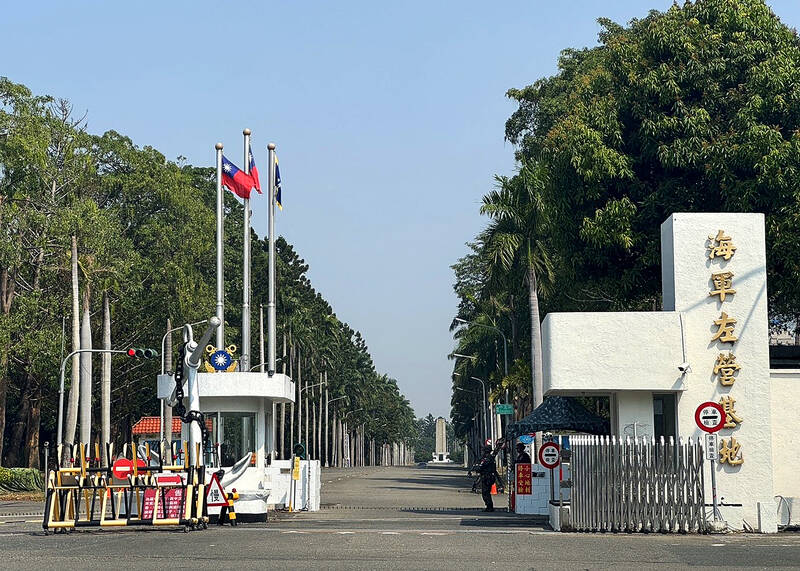The High Administrative Court rejected an appeal from a former naval chief petty officer who was dismissed for failing to report an attempt to recruit him for a Chinese spy operation, calling his unit’s action “reasonable.”
In 2022, the officer surnamed Tseng (曾), who was stationed at Zuoying (左營) naval base in Kaohsiung, was approached to join a spy network for China, the Kaohsiung branch of the court said.
Although he did not agree to the request, he did not report the matter to his unit as required by law, the court said.

Photo: Ge You-hao, Taipei Times
The recruiter was discovered to be retired air force colonel Liu Sheng-shu (劉聖恕), who has been sentenced to 20 years in prison for developing a spy network for China in exchange for NT$16.7 million (US$510,985).
Citing the minutes of his unit’s evaluation meeting, the judge said that as Tseng was responsible for ship maintenance, he was at high risk of leaking military secrets.
As he failed to reveal his contact with Liu, Tseng’s unit decided he was not vigilant enough and posed national security concerns, giving him a major demerit and deeming him unfit for service, the judge said.
The unit implemented strict assessment standards when evaluating Tseng’s case, the court said, calling its decision reasonable and rejecting Tseng’s appeal.
Investigators discovered that Liu asked for sensitive information from Tseng after lending him NT$20,000.
He also asked Tseng to install a GPS device on a warship and film a video pledging loyalty to the Chinese Communist Party, they found.
Liu, who joined a Taiwanese company in China after retiring from the military in 2013, was recruited by Chinese intelligence officers to obtain files on people working in the Taiwanese military and government agencies, investigators said.
In June last year, the Supreme Court upheld a 20-year prison sentence for Liu for operating a spy network in which six military officers were also charged with spying for China.
The 20-year sentence is the heaviest punishment in the past few years for military officers found guilty of espionage.
Additional reporting by Wen Yu-te and Jason Pan

INVESTIGATION: The case is the latest instance of a DPP figure being implicated in an espionage network accused of allegedly leaking information to Chinese intelligence Democratic Progressive Party (DPP) member Ho Jen-chieh (何仁傑) was detained and held incommunicado yesterday on suspicion of spying for China during his tenure as assistant to then-minister of foreign affairs Joseph Wu (吳釗燮). The Taipei District Prosecutors’ Office said Ho was implicated during its investigation into alleged spying activities by former Presidential Office consultant Wu Shang-yu (吳尚雨). Prosecutors said there is reason to believe Ho breached the National Security Act (國家安全法) by leaking classified Ministry of Foreign Affairs information to Chinese intelligence. Following interrogation, prosecutors petitioned the Taipei District Court to detain Ho, citing concerns over potential collusion or tampering of evidence. The

‘FORM OF PROTEST’: The German Institute Taipei said it was ‘shocked’ to see Nazi symbolism used in connection with political aims as it condemned the incident Sung Chien-liang (宋建樑), who led efforts to recall Democratic Progressive Party (DPP) Legislator Lee Kun-cheng (李坤城), was released on bail of NT$80,000 yesterday amid an outcry over a Nazi armband he wore to questioning the night before. Sung arrived at the New Taipei City District Prosecutors’ Office for questioning in a recall petition forgery case on Tuesday night wearing a red armband bearing a swastika, carrying a copy of Adolf Hitler’s Mein Kampf and giving a Nazi salute. Sung left the building at 1:15am without the armband and apparently covering the book with a coat. This is a serious international scandal and Chinese

Seventy percent of middle and elementary schools now conduct English classes entirely in English, the Ministry of Education said, as it encourages schools nationwide to adopt this practice Minister of Education (MOE) Cheng Ying-yao (鄭英耀) is scheduled to present a report on the government’s bilingual education policy to the Legislative Yuan’s Education and Culture Committee today. The report would outline strategies aimed at expanding access to education, reducing regional disparities and improving talent cultivation. Implementation of bilingual education policies has varied across local governments, occasionally drawing public criticism. For example, some schools have required teachers of non-English subjects to pass English proficiency

TRADE: The premier pledged safeguards on ‘Made in Taiwan’ labeling, anti-dumping measures and stricter export controls to strengthen its position in trade talks Products labeled “made in Taiwan” must be genuinely made in Taiwan, Premier Cho Jung-tai (卓榮泰) said yesterday, vowing to enforce strict safeguards against “origin laundering” and initiate anti-dumping investigations to prevent China dumping its products in Taiwan. Cho made the remarks in a discussion session with representatives from industries in Kaohsiung. In response to the US government’s recent announcement of “reciprocal” tariffs on its trading partners, President William Lai (賴清德) and Cho last week began a series of consultations with industry leaders nationwide to gather feedback and address concerns. Taiwanese and US officials held a videoconference on Friday evening to discuss the